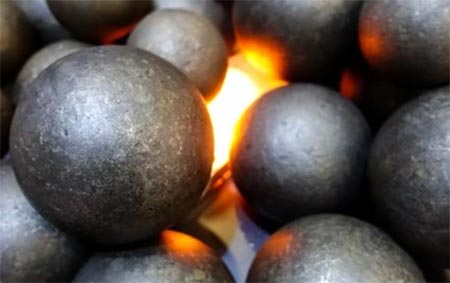What is steel grinding balls?
Views: 651 Update Date:May 24 , 2024
Steel grinding balls are specialized spherical objects used primarily in the mining, cement, and other industries to crush or grind materials such as ores, coal, or cement in ball mills or SAG (semi-autogenous grinding) mills. Here’s a detailed overview of their characteristics, uses, and manufacturing process:
* Size: They come in various diameters, typically ranging from a few millimeters to several inches.
* Hardness: Heat treatment processes are used to increase the hardness and durability of the balls, which is crucial for their performance in grinding operations.
* Cement Industry: Used in the grinding of clinker and raw materials to produce cement.
* Casting: The molten steel is cast into balls using a continuous casting process or a forging process to ensure uniformity and eliminate defects.
* Heat Treatment: The cast balls are subjected to heat treatment, which includes quenching and tempering to enhance their hardness and toughness.
* Grinding: Some balls are ground to achieve a precise size and shape, ensuring uniformity and better performance.
* Quality Control: Finished grinding balls undergo rigorous quality control checks to ensure they meet the required specifications in terms of size, hardness, and composition.
* Durability: Properly heat-treated balls have high resistance to wear and tear, prolonging their operational life.
* Cost-Effective: While the initial cost might be higher than other grinding media, their long lifespan and efficiency make steel grinding balls cost-effective in the long run.
* Size and Hardness: The size and hardness of the balls need to match the requirements of the grinding process and the material being processed.
* Corrosion Resistance: For applications involving corrosive materials, stainless steel or other corrosion-resistant alloys might be preferred.
Steel grinding balls are integral to the efficient operation of various grinding and milling processes, playing a crucial role in many industrial applications by improving the efficiency and effectiveness of material reduction.
Prev: What happens to steel when forged?
Next: How are steel balls manufactured?
Characteristics
* Material: Made from various grades of steel, with high-carbon steel being the most common. Stainless steel and other alloy steels are also used depending on the specific requirements of the application.* Size: They come in various diameters, typically ranging from a few millimeters to several inches.
* Hardness: Heat treatment processes are used to increase the hardness and durability of the balls, which is crucial for their performance in grinding operations.
Uses
* Mining Industry: Used to grind ores into finer particles for subsequent processing and extraction of valuable minerals.* Cement Industry: Used in the grinding of clinker and raw materials to produce cement.
* Chemical and Power Plants: Employed in the grinding of coal for power generation and various other chemical processes.

Manufacturing Process
* Melting: Steel is melted in a furnace, typically an electric arc furnace, to achieve the desired composition.* Casting: The molten steel is cast into balls using a continuous casting process or a forging process to ensure uniformity and eliminate defects.
* Heat Treatment: The cast balls are subjected to heat treatment, which includes quenching and tempering to enhance their hardness and toughness.
* Grinding: Some balls are ground to achieve a precise size and shape, ensuring uniformity and better performance.
* Quality Control: Finished grinding balls undergo rigorous quality control checks to ensure they meet the required specifications in terms of size, hardness, and composition.
Advantages
* Efficiency: The high hardness and uniformity of steel grinding balls provide efficient grinding, reducing the energy consumption of the mills.* Durability: Properly heat-treated balls have high resistance to wear and tear, prolonging their operational life.
* Cost-Effective: While the initial cost might be higher than other grinding media, their long lifespan and efficiency make steel grinding balls cost-effective in the long run.
Selection Criteria
* Material Composition: Depending on the material being ground, different compositions of steel might be chosen to ensure optimal performance.* Size and Hardness: The size and hardness of the balls need to match the requirements of the grinding process and the material being processed.
* Corrosion Resistance: For applications involving corrosive materials, stainless steel or other corrosion-resistant alloys might be preferred.
Steel grinding balls are integral to the efficient operation of various grinding and milling processes, playing a crucial role in many industrial applications by improving the efficiency and effectiveness of material reduction.





